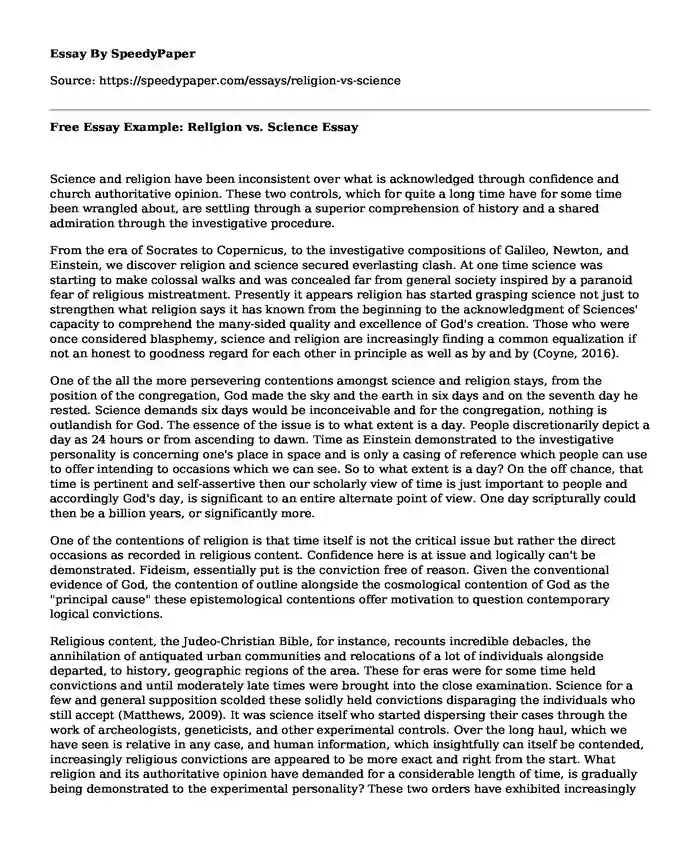Science and religion have been inconsistent over what is acknowledged through confidence and church authoritative opinion. These two controls, which for quite a long time have for some time been wrangled about, are settling through a superior comprehension of history and a shared admiration through the investigative procedure.
From the era of Socrates to Copernicus, to the investigative compositions of Galileo, Newton, and Einstein, we discover religion and science secured everlasting clash. At one time science was starting to make colossal walks and was concealed far from general society inspired by a paranoid fear of religious mistreatment. Presently it appears religion has started grasping science not just to strengthen what religion says it has known from the beginning to the acknowledgment of Sciences' capacity to comprehend the many-sided quality and excellence of God's creation. Those who were once considered blasphemy, science and religion are increasingly finding a common equalization if not an honest to goodness regard for each other in principle as well as by and by (Coyne, 2016).
One of the all the more persevering contentions amongst science and religion stays, from the position of the congregation, God made the sky and the earth in six days and on the seventh day he rested. Science demands six days would be inconceivable and for the congregation, nothing is outlandish for God. The essence of the issue is to what extent is a day. People discretionarily depict a day as 24 hours or from ascending to dawn. Time as Einstein demonstrated to the investigative personality is concerning one's place in space and is only a casing of reference which people can use to offer intending to occasions which we can see. So to what extent is a day? On the off chance, that time is pertinent and self-assertive then our scholarly view of time is just important to people and accordingly God's day, is significant to an entire alternate point of view. One day scripturally could then be a billion years, or significantly more.
One of the contentions of religion is that time itself is not the critical issue but rather the direct occasions as recorded in religious content. Confidence here is at issue and logically can't be demonstrated. Fideism, essentially put is the conviction free of reason. Given the conventional evidence of God, the contention of outline alongside the cosmological contention of God as the "principal cause" these epistemological contentions offer motivation to question contemporary logical convictions.
Religious content, the Judeo-Christian Bible, for instance, recounts incredible debacles, the annihilation of antiquated urban communities and relocations of a lot of individuals alongside departed, to history, geographic regions of the area. These for eras were for some time held convictions and until moderately late times were brought into the close examination. Science for a few and general supposition scolded these solidly held convictions disparaging the individuals who still accept (Matthews, 2009). It was science itself who started dispersing their cases through the work of archeologists, geneticists, and other experimental controls. Over the long haul, which we have seen is relative in any case, and human information, which insightfully can itself be contended, increasingly religious convictions are appeared to be more exact and right from the start. What religion and its authoritative opinion have demanded for a considerable length of time, is gradually being demonstrated to the experimental personality? These two orders have exhibited increasingly consent to stories and verifiable references and keep on working together and in the conventional logical strategy. These have offered a path to the "standard of philanthropy," where every order now offers scope to each other's perspectives until there is a reason or more conclusive confirmation that it is not.
References
Coyne, Jerry A. (2016). Faith Versus Fact: Why Science and Religion Are Incompatible. Penguin Group USA.
Matthews, M. R. (2009). Science, worldviews and education. Dordrecht: Springer.
Cite this page
Free Essay Example: Religion vs. Science. (2019, Sep 09). Retrieved from https://speedypaper.net/essays/religion-vs-science
Request Removal
If you are the original author of this essay and no longer wish to have it published on the SpeedyPaper website, please click below to request its removal:
- Free Essay: The Case against Grammar Correction in L2 Writing Classes Review
- Free Essay Sample on Memory Span
- Polyglots Definition Essay Samples
- Free Essay on the Issue: Is Football Too Dangerous as a Sport?
- Essay Sample on Addiction and Obsession in the Thin Documentary
- Essay Sample on Ergonomics Assessment in the Manufacturing Industry
- Essay Example. Interaction Between Gifted Students and Teachers
Popular categories





